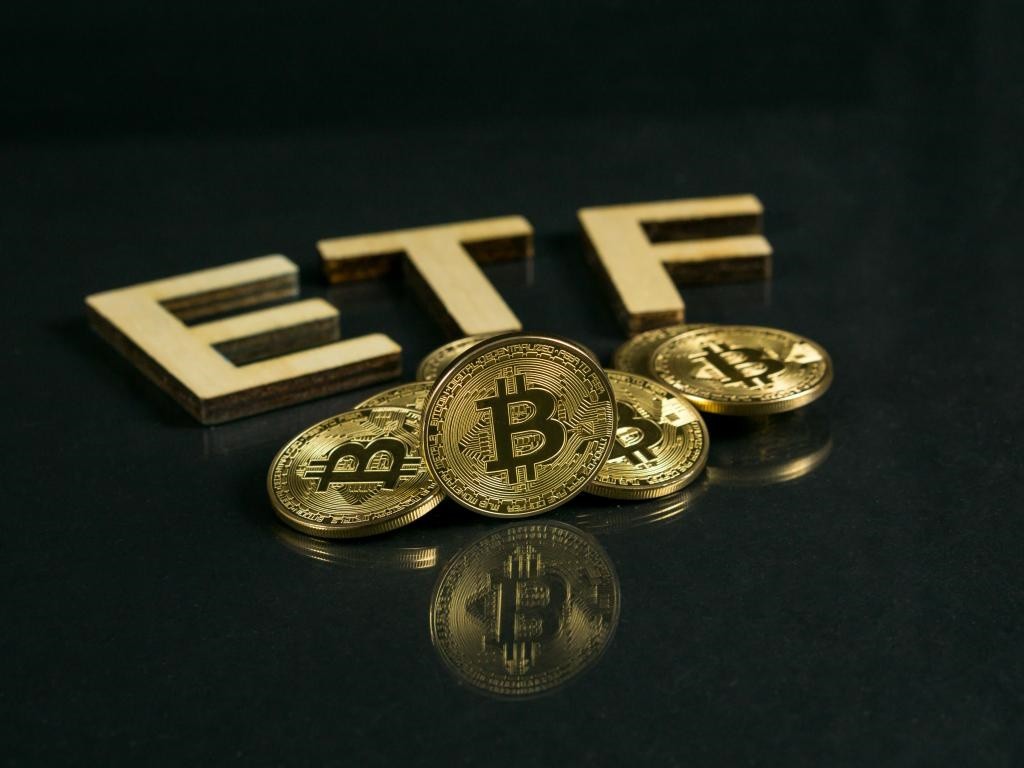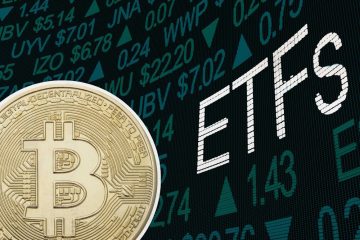Wall Street gets laser eyes in bid for Bitcoin ETF bucks

Listen to firms on Wall Street these days, and you might think you’re knocking down beers with a gaggle of crypto bros.
Larry Fink, chief executive of BlackRock, the world’s largest asset manager, told CNBC last month that he was a big believer in bitcoin. A few days later, Howard Lutnick, the CEO of financial-services firm Cantor Fitzgerald, predicted that bitcoin would rally this year. He also praised Tether Holdings, the firm behind the widely used stablecoin tether.
“Holding a dollar in a token is amazing,” Lutnick, whose firm manages much of Tether’s bond portfolio, said in a televised interview from Davos, Switzerland. In 2021, Tether’s creators reached a $41 million settlement with U.S. regulators over allegations that they misled investors about whether the coin was fully backed by dollars. Tether didn’t admit wrongdoing.
After years of tiptoeing around the world of cryptocurrencies, huge financial firms are racing to lure Main Street investors into these mostly unregulated markets, seeking a fresh source of revenue. The stampede has been prompted largely by January’s heavily anticipated launch of exchange-traded funds that directly hold bitcoin. Bitcoin proponents hope the ETFs will boost the price of the digital currency by opening it to a wider investor base, but many outsiders question whether these highly speculative assets belong in the average individual’s portfolio.
Some asset managers backing the new ETFs have flaunted their bitcoin bona fides on social media, dropping memes and lingo familiar to the crypto community, though perhaps obscure to everyone else.
For example, you might not know that Jan. 3 was the 15th anniversary of the first bitcoin transaction, but Invesco made it clear that it did: The $1.6 trillion asset manager wished bitcoin a happy birthday on its official X account.
“BOOORN TO BITCOIN,” investment-management firm VanEck tweeted on Jan. 16. The fund manager later tweeted at Merriam-Webster, asking why its dictionary didn’t include “HODL,” a term used by bitcoin investors to mean never selling one’s coins despite wild volatility.
Franklin Templeton, a 77-year-old asset-management company, was named after Benjamin Franklin because he “epitomized the ideas of frugality and prudence,” according to its website. In January, the firm tweaked its official X profile picture to show the U.S. founding father with laser eyes, a meme popular with bitcoin bulls.
“In crypto, speculation is a feature, not a bug,” Franklin Templeton tweeted on Jan. 17, during a roughly 90-minute stunt in which the firm’s digital-assets team took control of the X account. In other posts, Franklin Templeton cited the “massive potential” of some blockchain networks and circulated a meme that appeared to endorse adding bitcoin to a traditional 60/40 portfolio of stocks and bonds.
“We’re always trying to stay fresh and current,” said Roger Bayston, head of digital assets at Franklin Templeton.
The firm recently removed the laser eyes from Benjamin Franklin’s image on its main X account. It also deleted a crypto-themed post featuring a meme with images of former WWE boss Vince McMahon after an ex-employee filed a lawsuit accusing him of sex trafficking. McMahon has denied the allegations. “Given the allegations at that time, we felt that removing the tweet was the most appropriate course of action,” a Franklin Templeton spokeswoman said.
Some crypto skeptics said Wall Street’s embrace of bitcoin rang hollow, calling it a thinly disguised attempt to cash in on an emerging asset class.
“Fee revenue is the name of the game on Wall Street. This is a new opportunity to get fees,” said Lee Reiners, a lecturing fellow in economics at Duke University.
To be sure, some of the biggest players in traditional finance are still wary. Vanguard Group has refused to provide access to bitcoin ETFs via its brokerage platform, saying they don’t align with its philosophy of enabling long-term, buy-and-hold investing. And Jamie Dimon, CEO of JPMorgan Chase, has maintained his personal skepticism of bitcoin even as the bank has agreed to facilitate trading in BlackRock’s bitcoin ETF.
Bitcoin is a useless “pet rock,” Dimon told CNBC on Jan. 17. “My personal advice is don’t get involved, but I don’t want to tell any one of you what to do. It’s a free country.”
There are risks for regulated financial firms that get too enthusiastic in marketing crypto. Last month, the Financial Industry Regulatory Authority released the results of a 2022 review of more than 500 crypto-related communications from 11 brokerage firms. More than 70% of the messages were potentially in violation of a Finra rule that prohibits false or exaggerated communications with the public, Finra said.
Not long ago, the crypto community viewed Wall Street as an ideological enemy. Bitcoin’s anonymous creator, Satoshi Nakamoto, originally envisioned his invention as a way to make payments without relying on banks, and many early bitcoiners were libertarians bent on creating a financial system outside of government control. In turn, most financial firms kept their distance from the unruly world of digital currencies.
Now, in much the same way that high fashion co-opted rebellious subcultures such as punk and grunge, the financial industry is echoing the messaging of crypto.
“Bitcoin may help guard against the government devaluing your money,” VanEck said in a recent television commercial for its new bitcoin ETF. In an interview, CEO Jan van Eck said the firm had a long history of offering products to help investors protect against inflation.

